FourFourTwo's 50 Best Football Managers in the World 2015: 50-46
It’s here! Start working your way through FFT’s guide to the world’s best gaffers with the men who just made it…
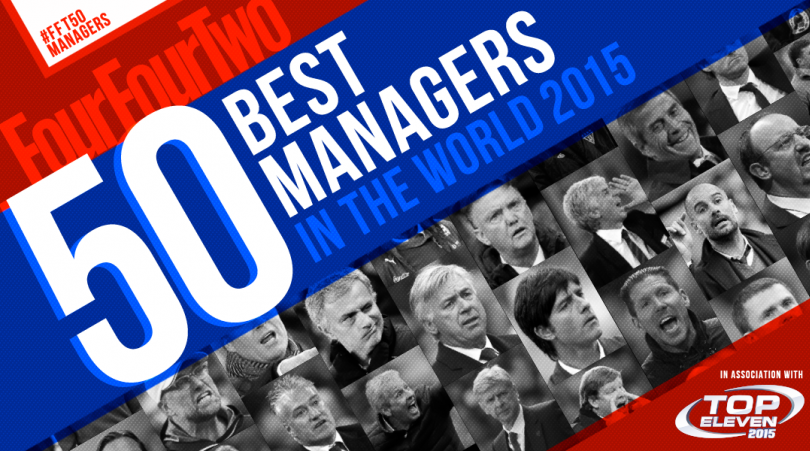
Words: Nick Ames, Martin Mazur, Alex Holiga, Chris Mayer, Kristan Heneage.
50) Florent Ibenge (DR Congo)
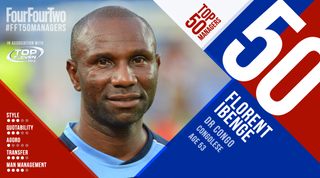
He’s a technician who knows how to show initiative. He called selectable people we didn't even think about, like Gael Kakuta, who perhaps could play for us
It’s often lamented that African managers don’t get the breaks their foreign counterparts receive, but they have a figure to inspire them in Ibenge. The Democratic Republic of the Congo manager took his freewheeling, attack-minded side to third place at this year’s Africa Cup of Nations, and there was the sense that a continental footballing power – and potentially a world one too – is finally waking up.
But that’s not the half of it. Ibenge only took the national team job in August 2014, and has since managed the Leopards alongside one of the country’s leading sides, AS Vita Club. He took them to the final of the African Champions League last year as they narrowly lost to Algerian side ES Setif on away goals, and admits that combining the two roles has been “hard, but a magnificent experience”.
Ibenge has an unusual background: he’s a qualified economist and worked for several years at smaller clubs in France, concurrently as an accountant at one stage. Ibenge’s big break came when his friend Nicolas Anelka asked for assistance during the ex-France international’s spell in charge of Shanghai Shenhua in 2012. Now 52, Ibenge may be a late developer but a formidable talent has been unlocked. NA
49) Juan Carlos Osorio (Sao Paulo)
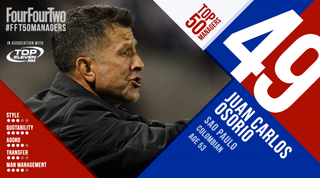
Not even Guardiola has the CV of Osorio. He is one of the most respected technical academics in the football world
Brazilians aren’t exactly keen on leaving their football clubs in the hands of foreigners. Generally, bosses from abroad must have either a previous playing career at the club that guarantees some recognition and patience from the fans, or, as in Osorio’s case, an impressive CV suggesting that they could be appointing the new Manuel Pellegrini. Giants Sao Paulo really made a bet when they signed the 54-year-old Colombian, who became a specialist in football studies after graduating in both the United States and England, having also been educated in the Netherlands.
Get FourFourTwo Newsletter
The best features, fun and footballing quizzes, straight to your inbox every week.
Osorio worked as a Manchester City coach under Kevin Keegan and managed in the MLS with New York Red Bulls before being granted a chance in his own country, but when it came, titles started piling up and his reputation of being a wonder coach grew bigger. First he took Once Caldas to an unlikely league title in 2010, and after a short stint at Mexican side Pueblas, was appointed by giants Atletico Nacional who quickly embraced him as the resurrector of Medellin’s football domination: five titles in just two years followed.
Referred to as ‘the recreationist’, Osorio’s training style is attractive and manages to keep players’ full attentions without them even realising. He’s appreciates the verticality of European football much more than that the slow build-up elsewhere, and still manages to visit training session of Guardiola or Van Gaal to see if he’s on the right path. “I’m studying all the time,” he admitted. MM
48) Pavel Vrba (Czech Republic)
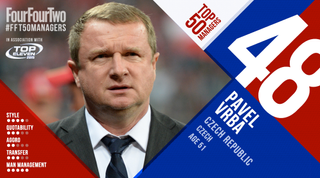
Me and Milan Petrzela were at a pig-slaughtering on Christmas. It got out of hand a bit and I sent Pavel a photo of us with the hog. He said he'd weigh us after the winter break...
Vrba may be one for hipsters here, because the 51-year-old is still little known outside his country. But his record speaks for itself. Here is a man who has been named Czech Coach of the Year for five seasons running – and with good reason, too.
His career as a boss has so far resembled something from Football Manager: taking over Viktoria Plzen, a modest provincial side who had never won anything before, Vrba transformed them into a domestic powerhouse and a force to be reckoned with in Europe, all the while insisting on an attractive and attacking brand of football.
He won four trophies with Viktoria, qualified for the Champions League group stage on a shoestring budget – twice – and led them to the Europa League knockout stage three seasons in a row, an unprecedented feat for a Czech club.
Then he moved on to manage the national team, these days a shadow of its former self. Vrba started the 2016 Euro qualifiers with four straight wins, but has lost some of his lustre after the team drew with Latvia and lost to Iceland. Otherwise, he might be higher on this list. Overachiever is the word. AH
47) Hein Vanhaezebrouck (Gent)
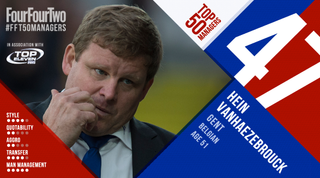
Vanhaezebrouck might be totally unknown internationally but he's highly respected in Belgium. At Kortrijk, the club was constantly forced to sell the best players, but he found replacements time and again
His name may look a mouthful to non-Flemish speakers, but it’s one you’ll need to practice ahead of next season.
After several years of remarkable work with limited resources at his hometown club Kortrijk, Vanhaezebrouck became Gent coach in 2014, tasked with restoring pride at a club that had become an also-ran. Few expected him to make such an immediate impact, though, as he took De Buffalos to an unlikely league title in his first season which was made even more impressive by that fact that Gent had never won one in their 115-year existence.
Tactically versatile and a good motivator, Vanhaezebrouck has a knack of raising the performance levels of unfancied players.
His keen eye for a bargain uncovered Nigerian forward Moses Simon, a sensation in Belgium last season. Vanhaezebrouck isn’t afraid to use unconventional methods to secure a target either: he once used an internet search engine at Kortrijk to recruit a left-sided attacker. The results found Istvan Bakx, who starred in his time at the club.
Having shaken up the top order in Belgium, Vanhaezebrouck’s bunch of misfits will now meet Europe’s elite in the Champions League group stages. CM
46) Bruce Arena (LA Galaxy)
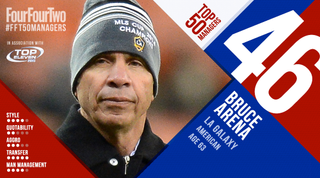
He talks a lot of trash before training, he talks a lot of trash during training, he talks a lot of trash after training. Guys come here knowing that you want to show each other up because you want to have pride in your game
A veteran coach of five MLS Cups, the 63-year-old Arena has displayed his greatest traits since taking over LA Galaxy in 2008 – not least the ability to reinvent.
Year after year the current champions are expected to suffer through losing the likes of David Beckham and Landon Donovan, but Arena doesn’t just work with stars: he builds them. Operating within a tight salary cap, players like Juninho (no, not that one; him neither) have come from nowhere to become staples of a successful side. In recent years the Galaxy boss has also begun to develop young talent, ensuring the next generation is as successful as the last.
Perhaps that’s not too surprising: like many American coaches, Arena earned his first opportunities via college soccer. Spells with Cornell and Virginia served as a precursor to his stint with the United States’ U23 team, before he moved into the newly formed Major League Soccer in 1996, coaching D.C. United alongside friend and protégé Bob Bradley.
Inevitably, Arena was handed the reigns of the U.S. national team after a disastrous World Cup in 1998, and remained in the position for eight years having guided them to an all-time high of fourth in the FIFA rankings. After a stint at the New York Red Bulls in 2006/07 he picked up where he left off on the international stage with Galaxy. Suffice to say, it’s going well. KH
FFT's 50 Best Football Managers: 50-46 • 45-41 • 40-36 • 35-31 • 30-26 • 25-21 • 20-16 • 15-11 • 10 • 9 • 8 • 7 • 6 • 5 • 4 • 3 • 2 • 1
#FFT50MANAGERS See our full list of top 50 managers in the world and features on them here
Most Popular
